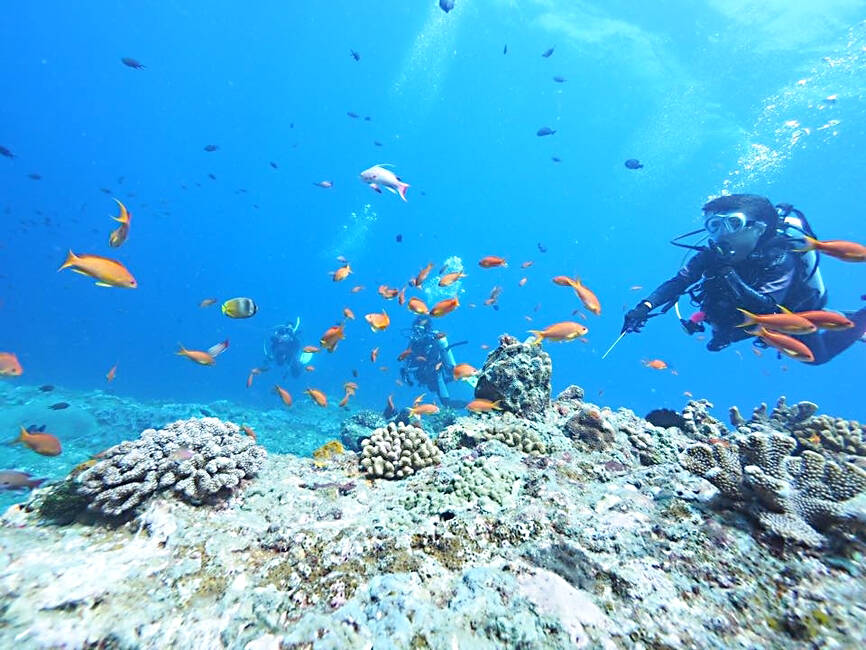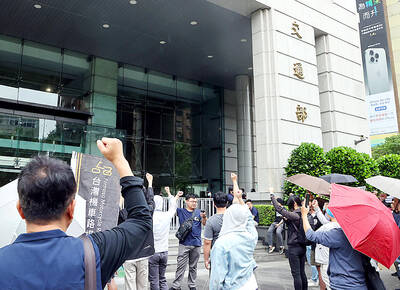People who want to go free diving in national scenic areas must present proof of their abilities and be accompanied by people who are familiar with the waters, the Tourism Administration said yesterday.
Free diving involves divers holding their breath until resurfacing, instead of using scuba gear.
The administration recently held a meeting to discuss the feasibility of regulating the increasingly popular recreational activity amid safety concerns.

Photo: Tsai Tsung-hsien, Taipei Times
Free divers visiting national scenic areas would be required show proof of their abilities issued by a domestic and overseas diving association, tourism officials said, adding they would not need any other licenses or certificates.
The Sports Administration would be in charge of establishing a system to certify and verify people’s abilities, the officials said.
Free divers would also have to be accompanied by people “who are familiar with waters in the diving area,” they said.
Those joining tours organized by free-diving service operators must be accompanied by certified coaches, who can accompany groups of no more than six at a time, the officials said.
Taiwan Freediving Development Association spokesperson Wu Ping-yu (吳秉宥) said the Tourism Administration and the association are generally in sync in terms of regulating the activity.
The association hopes together they can find ways to engage in meaningful oversight, Wu added.
Those who participated in the Tourism Administration meeting failed to agree on the definition of “people familiar with waters in the diving area,” a source familiar with the matter said, adding that it would be a major step backward for the government’s “Salute to the Seas” policy if people could only go free diving through tours organized by free-diving service operators.
Some meeting participants said that the government should list the responsibilities of free divers’ companions, as free divers should all be capable of rescuing one another in an emergency situation, the source said.
However, tourism officials said the requirement would put pressure on companions, and it might be difficult for the government to track whether companions have fulfilled their responsibilities.
Regulations for free diving are to be finalized and announced befor next year, the officials said.

CHANGES: After-school tutoring periods, extracurricular activities during vacations or after-school study periods must not be used to teach new material, the ministry said The Ministry of Education yesterday announced new rules that would ban giving tests to most elementary and junior-high school students during morning study and afternoon rest periods. The amendments to regulations governing public education at elementary schools and junior high schools are to be implemented on Aug. 1. The revised rules stipulate that schools are forbidden to use after-school tutoring periods, extracurricular activities during summer or winter vacation or after-school study periods to teach new course material. In addition, schools would be prohibited from giving tests or exams to students in grades one to eight during morning study and afternoon break periods, the

GOOD DIPLOMACY: The KMT has maintained close contact with representative offices in Taiwan and had extended an invitation to Russia as well, the KMT said The Chinese Nationalist Party (KMT) would “appropriately handle” the fallout from an invitation it had extended to Russia’s representative to Taipei to attend its international banquet last month, KMT Chairman Eric Chu (朱立倫) said yesterday. US and EU representatives in Taiwan boycotted the event, and only later agreed to attend after the KMT rescinded its invitation to the Russian representative. The KMT has maintained long-term close contact with all representative offices and embassies in Taiwan, and had extended the invitation as a practice of good diplomacy, Chu said. “Some EU countries have expressed their opinions of Russia, and the KMT respects that,” he

Advocates of the rights of motorcycle and scooter riders yesterday protested in front of the Ministry of Transportation and Communications in Taipei, making three demands. They were joined by 30 passenger vehicles, which surrounded the ministry to make three demands related to traffic regulations — that motorcycles and scooters above 250cc be allowed on highways, that all motorcycles and scooters be allowed on inside lanes, and that driver and rider training programs be reformed. The ministry said that it has no plans to allow motorcycles on national highways for the time being, and said that motorcycles would be allowed on the inner

AMENDMENT: Contact with certain individuals in China, Hong Kong and Macau must be reported, and failure to comply could result in a prison sentence, the proposal stated The Chinese Nationalist Party (KMT) and the Taiwan People’s Party (TPP) yesterday voted against a proposed bill by Democratic Progressive Party (DPP) lawmakers that would require elected officials to seek approval before visiting China. DPP Legislator Puma Shen’s (沈伯洋) proposed amendments to the Act Governing Relations Between the People of the Taiwan Area and the Mainland Area (臺灣地區與大陸地區人民關係條例), stipulate that contact with certain individuals in China, Hong Kong and Macau should be reported, while failure to comply would be punishable by prison sentences of up to three years, alongside a fine of NT$10 million (US$309,041). Fifty-six voted with the TPP in opposition